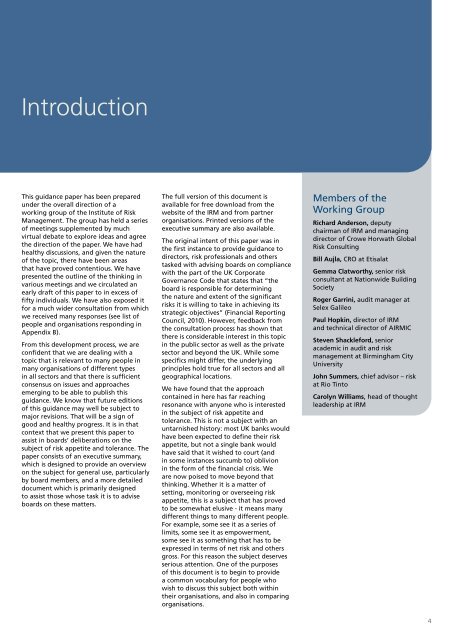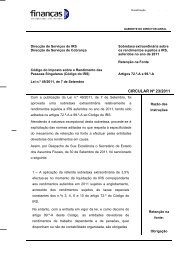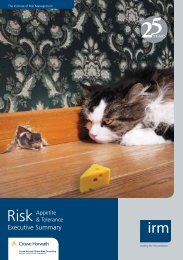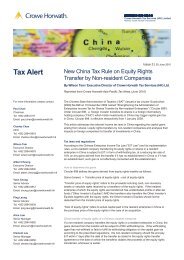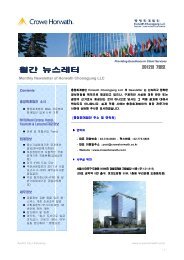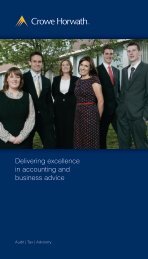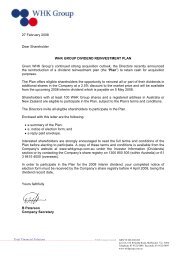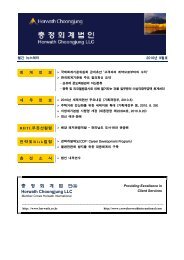Guidance Paper - The Institute of Risk Management
Guidance Paper - The Institute of Risk Management
Guidance Paper - The Institute of Risk Management
Create successful ePaper yourself
Turn your PDF publications into a flip-book with our unique Google optimized e-Paper software.
Introduction<br />
This guidance paper has been prepared<br />
under the overall direction <strong>of</strong> a<br />
working group <strong>of</strong> the <strong>Institute</strong> <strong>of</strong> <strong>Risk</strong><br />
<strong>Management</strong>. <strong>The</strong> group has held a series<br />
<strong>of</strong> meetings supplemented by much<br />
virtual debate to explore ideas and agree<br />
the direction <strong>of</strong> the paper. We have had<br />
healthy discussions, and given the nature<br />
<strong>of</strong> the topic, there have been areas<br />
that have proved contentious. We have<br />
presented the outline <strong>of</strong> the thinking in<br />
various meetings and we circulated an<br />
early draft <strong>of</strong> this paper to in excess <strong>of</strong><br />
fifty individuals. We have also exposed it<br />
for a much wider consultation from which<br />
we received many responses (see list <strong>of</strong><br />
people and organisations responding in<br />
Appendix B).<br />
From this development process, we are<br />
confident that we are dealing with a<br />
topic that is relevant to many people in<br />
many organisations <strong>of</strong> different types<br />
in all sectors and that there is sufficient<br />
consensus on issues and approaches<br />
emerging to be able to publish this<br />
guidance. We know that future editions<br />
<strong>of</strong> this guidance may well be subject to<br />
major revisions. That will be a sign <strong>of</strong><br />
good and healthy progress. It is in that<br />
context that we present this paper to<br />
assist in boards’ deliberations on the<br />
subject <strong>of</strong> risk appetite and tolerance. <strong>The</strong><br />
paper consists <strong>of</strong> an executive summary,<br />
which is designed to provide an overview<br />
on the subject for general use, particularly<br />
by board members, and a more detailed<br />
document which is primarily designed<br />
to assist those whose task it is to advise<br />
boards on these matters.<br />
<strong>The</strong> full version <strong>of</strong> this document is<br />
available for free download from the<br />
website <strong>of</strong> the IRM and from partner<br />
organisations. Printed versions <strong>of</strong> the<br />
executive summary are also available.<br />
<strong>The</strong> original intent <strong>of</strong> this paper was in<br />
the first instance to provide guidance to<br />
directors, risk pr<strong>of</strong>essionals and others<br />
tasked with advising boards on compliance<br />
with the part <strong>of</strong> the UK Corporate<br />
Governance Code that states that “the<br />
board is responsible for determining<br />
the nature and extent <strong>of</strong> the significant<br />
risks it is willing to take in achieving its<br />
strategic objectives” (Financial Reporting<br />
Council, 2010). However, feedback from<br />
the consultation process has shown that<br />
there is considerable interest in this topic<br />
in the public sector as well as the private<br />
sector and beyond the UK. While some<br />
specifics might differ, the underlying<br />
principles hold true for all sectors and all<br />
geographical locations.<br />
We have found that the approach<br />
contained in here has far reaching<br />
resonance with anyone who is interested<br />
in the subject <strong>of</strong> risk appetite and<br />
tolerance. This is not a subject with an<br />
untarnished history: most UK banks would<br />
have been expected to define their risk<br />
appetite, but not a single bank would<br />
have said that it wished to court (and<br />
in some instances succumb to) oblivion<br />
in the form <strong>of</strong> the financial crisis. We<br />
are now poised to move beyond that<br />
thinking. Whether it is a matter <strong>of</strong><br />
setting, monitoring or overseeing risk<br />
appetite, this is a subject that has proved<br />
to be somewhat elusive - it means many<br />
different things to many different people.<br />
For example, some see it as a series <strong>of</strong><br />
limits, some see it as empowerment,<br />
some see it as something that has to be<br />
expressed in terms <strong>of</strong> net risk and others<br />
gross. For this reason the subject deserves<br />
serious attention. One <strong>of</strong> the purposes<br />
<strong>of</strong> this document is to begin to provide<br />
a common vocabulary for people who<br />
wish to discuss this subject both within<br />
their organisations, and also in comparing<br />
organisations.<br />
Members <strong>of</strong> the<br />
Working Group<br />
Richard Anderson, deputy<br />
chairman <strong>of</strong> IRM and managing<br />
director <strong>of</strong> Crowe Horwath Global<br />
<strong>Risk</strong> Consulting<br />
Bill Aujla, CRO at Etisalat<br />
Gemma Clatworthy, senior risk<br />
consultant at Nationwide Building<br />
Society<br />
Roger Garrini, audit manager at<br />
Selex Galileo<br />
Paul Hopkin, director <strong>of</strong> IRM<br />
and technical director <strong>of</strong> AIRMIC<br />
Steven Shackleford, senior<br />
academic in audit and risk<br />
management at Birmingham City<br />
University<br />
John Summers, chief advisor – risk<br />
at Rio Tinto<br />
Carolyn Williams, head <strong>of</strong> thought<br />
leadership at IRM<br />
4


